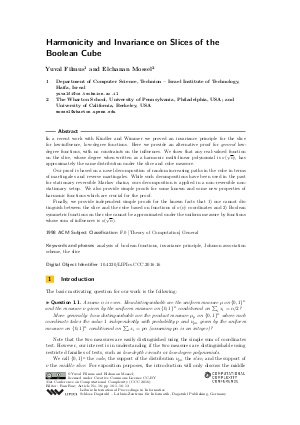Harmonicity and Invariance on Slices of the Boolean Cube
Authors Yuval Filmus, Elchanan Mossel
-
Part of:
Volume:
31st Conference on Computational Complexity (CCC 2016)
Part of: Series: Leibniz International Proceedings in Informatics (LIPIcs)
Part of: Conference: Computational Complexity Conference (CCC) - License:
 Creative Commons Attribution 3.0 Unported license
Creative Commons Attribution 3.0 Unported license
- Publication Date: 2016-05-19
File

PDF
LIPIcs.CCC.2016.16.pdf
- Filesize: 0.5 MB
- 13 pages
Document Identifiers
Subject Classification
Keywords
- analysis of boolean functions
- invariance principle
- Johnson association scheme
- the slice
Metrics
- Access Statistics
-
Total Accesses (updated on a weekly basis)
0Document
0Metadata
Abstract
In a recent work with Kindler and Wimmer we proved an invariance principle for the slice for low-influence, low-degree functions. Here we provide an alternative proof for general low-degree functions, with no constraints on the influences. We show that any real-valued function on the slice, whose degree when written as a harmonic multi-linear polynomial is o(sqrt(n)), has approximately the same distribution under the slice and cube measure. Our proof is based on a novel decomposition of random increasing paths in the cube in terms of martingales and reverse martingales. While such decompositions have been used in the past for stationary reversible Markov chains, ours decomposition is applied in a non-reversible non-stationary setup. We also provide simple proofs for some known and some new properties of harmonic functions which are crucial for the proof. Finally, we provide independent simple proofs for the known facts that 1) one cannot distinguish between the slice and the cube based on functions of little of of n coordinates and 2) Boolean symmetric functions on the cube cannot be approximated under the uniform measure by functions whose sum of influences is o(sqrt(n)).
Cite As Get BibTex
Yuval Filmus and Elchanan Mossel. Harmonicity and Invariance on Slices of the Boolean Cube. In 31st Conference on Computational Complexity (CCC 2016). Leibniz International Proceedings in Informatics (LIPIcs), Volume 50, pp. 16:1-16:13, Schloss Dagstuhl – Leibniz-Zentrum für Informatik (2016)
https://doi.org/10.4230/LIPIcs.CCC.2016.16
BibTex
@InProceedings{filmus_et_al:LIPIcs.CCC.2016.16,
author = {Filmus, Yuval and Mossel, Elchanan},
title = {{Harmonicity and Invariance on Slices of the Boolean Cube}},
booktitle = {31st Conference on Computational Complexity (CCC 2016)},
pages = {16:1--16:13},
series = {Leibniz International Proceedings in Informatics (LIPIcs)},
ISBN = {978-3-95977-008-8},
ISSN = {1868-8969},
year = {2016},
volume = {50},
editor = {Raz, Ran},
publisher = {Schloss Dagstuhl -- Leibniz-Zentrum f{\"u}r Informatik},
address = {Dagstuhl, Germany},
URL = {https://drops.dagstuhl.de/entities/document/10.4230/LIPIcs.CCC.2016.16},
URN = {urn:nbn:de:0030-drops-58240},
doi = {10.4230/LIPIcs.CCC.2016.16},
annote = {Keywords: analysis of boolean functions, invariance principle, Johnson association scheme, the slice}
}
Author Details
References
-
Franćois Bergeron. Algebraic Combinatorics and Coinvariant Spaces. CMS Treatises in Mathematics. A K Peters, 2009.

-
Ravi B Boppana. The average sensitivity of bounded-depth circuits. Information Processing Letters, 63(5):257-261, 1997.

-
Charles F. Dunkl. A Krawtchouk polynomial addition theorem and wreath products of symmetric groups. Indiana Univ. Math. J., 25:335-358, 1976.

-
Charles F. Dunkl. Orthogonal functions on some permutation groups. In Relations between combinatorics and other parts of mathematics, volume 34 of Proc. Symp. Pure Math., pages 129-147, Providence, RI, 1979. Amer. Math. Soc.

-
Yuval Filmus. An orthogonal basis for functions over a slice of the boolean hypercube. Elec. J. Comb., 23(1):P1.23, 2016.

-
Yuval Filmus, Guy Kindler, Elchanan Mossel, and Karl Wimmer. Invariance principle on the slice. In 31st Conf. Comp. Comp., 2016.

-
Johan Håstad. Almost optimal lower bounds for small depth circuits. In Silvio Micali, editor, Randomness and Computation, volume 5 of Advances in Computing Research, pages 143-170. JAI Press, 1989.

-
Wassily Hoeffding. Probability inequalities for sums of bounded random variables. Journal of the American statistical association, 58(301):13-30, 1963.

-
Guy Kindler. Property testing, PCP and Juntas. PhD thesis, Tel-Aviv University, 2002.

-
Guy Kindler and Shmuel Safra. Noise-resistant Boolean functions are juntas, 2004. Unpublished manuscript.

-
Tzong-Yau Lee and Horng-Tzer Yau. Logarithmic Sobolev inequality for some models of random walks. Ann. Prob., 26(4):1855-1873, 1998.

-
N. Linial, Y. Mansour, and N. Nisan. Constant depth circuits, fourier transform and learnability. Journal of the ACM, 40(3):607-620, 1993.

-
Terry J. Lyons and T. S. Zhang. Decomposition of Dirichlet processes and its application. Ann. Probab., 22(1):494-524, 1994.

-
Elchanan Mossel, Ryan O'Donnell, and Krzysztof Oleszkiewicz. Noise stability of functions with low influences: Invariance and optimality. Ann. Math., 171:295-341, 2010.

-
Assaf Naor, Yuval Peres, Oded Schramm, and Scott Sheffield. Markov chains in smooth Banach spaces and Gromov-hyperbolic metric spaces. Duke Math J., 134(1):165-197, 2006.

-
Ryan O'Donnell and Karl Wimmer. Approximation by DNF: Examples and counterexamples. In Automata, Languages and Programming, volume 4596 of Lecture Notes in Computer Science, pages 195-206. Springer Berlin Heidelberg, 2007.

-
Murali K. Srinivasan. Symmetric chains, Gelfand-Tsetlin chains, and the Terwilliger algebra of the binary Hamming scheme. J. Algebr. Comb., 34(2):301-322, 2011.

-
Avishay Tal. Tight bounds on the Fourier spectrum of AC⁰. Manuscript, 2014.

